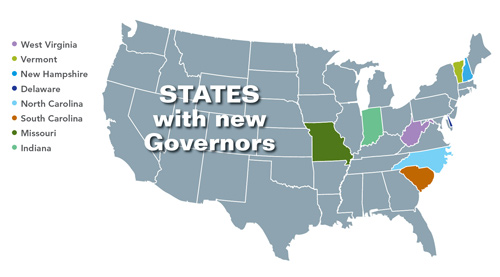Gubernatorial Shift: New Economic Development Policies
New governors of eight states reveal their ideas for strengthening their states’ economies and growing their business bases.
Q1 2017

Delaware
Governor John Carney, formerly the lone U.S. representative for Delaware, has placed economic development among his administration’s top priorities. However, with a projected budget shortfall for FY’18, Governor Carney must first address the state’s fiscal situation.
The governor has asked the public to weigh in on the “Budget Reset” process. Over the coming months, the administration, along with members of the General Assembly, will hold town hall meetings across the state to discuss challenges and elicit ideas from constituents. In addition to these discussions, a website has been created for state residents to submit ideas directly to the governor’s office.
In his budget recommendations for FY’18, Governor Carney outlined where he believes economic development targets should be focused. These marks include further investments in designated Downtown Development Districts, $10 million for the Delaware Strategic Fund, infrastructure funding for the Port of Wilmington, and monies directly aimed at biopharmaceuticals and life sciences.
Indiana
With former Governor Mike Pence’s new role in the White House, Governor Eric Holcomb has officially taken over the reins of the Hoosier State. In his first State of the State address, Governor Holcomb outlined several key policies for economic development in Indiana.
To encourage further investment in Indiana communities, he proposed an additional $4 million for the Regional Cities Initiative. The governor also placed a heavy focus on infrastructure spending, including an additional fourth water port in southeastern Indiana.
He also discussed the need for continued spending on workforce development programs in the state, which would include an investment of $2 million to create regional Jobs Ready Grants to help state residents receive credentials or certificates for more skilled and highly paid jobs. Additionally, the governor proposed establishing a Superintendent of Public Instruction, a governor-appointed position to begin in 2021.
Missouri
Newly elected Governor Eric Greitens wasted no time targeting Missouri’s tax incentive programs. During his State of the State address, Governor Greitens called for an extensive audit, and then signed an executive order creating a special review committee. In his address, the governor previewed this new order: “Together, with a team of outsiders and legislators, we are going to do a thorough, end-to-end audit of our tax credit system — and create a tax code that works not to benefit privileged insiders, but instead is fair to all.”
State legislators have followed the lead by introducing bills directly impacting state incentive programs, including annual caps on funding, new approval procedures concurrent with annual budgets, and placing expiration dates on business incentives, among other measures. Business leaders should take note of these potential changes as the year progresses.
New Hampshire
Governor Chris Sununu, son of former Granite State Governor John H. Sununu, laid out his agenda in his recent 2017 budget address. The new governor put the state’s economy at the top. Governor Sununu lead with the goal “…to create a fiscal and regulatory environment that promises greater job growth, job retention, workforce development, and economic opportunity for all.”
In doing so, Governor Sununu targeted infrastructure investment, which would include any surplus beyond an increase of the state’s Rainy Day Fund to $100 million; expanding investment in education; and creating a new department built specifically for businesses — Business and Economic Affairs, which as proposed, would house the state’s economic development division, among other business-related offices.
Senate Democratic leaders recently proposed economic development policies for the new administration to consider. These proposals focus squarely on workforce and education. Among the programs the leaders targeted is the New Hampshire College Graduate Incentive Partnership (GRIP) — a program providing a $1,000 incentive for each year of work for the initial four years in the workforce.
North Carolina
Governor Roy Cooper takes over leadership in North Carolina at a pivotal period in the state’s history. Known as a business friendly environment, the Tar Heel State has faced multiple challenges in recent years and state politics are as contentious as ever. As the state’s attorney general since 2001, the new governor is well aware of the situation moving forward. Nevertheless, optimism is still high in the state, especially with an estimated budget surplus of $552.5 million.
As of this writing, the public controversy surrounding House Bill 2 (HB2) continues in Raleigh. Governor Cooper has targeted repeal of the legislation as one of his top priorities. Debate over the controversial legislation is expected to occur in the early months of 2017.
During the campaign, Governor Cooper outlined his key economic initiatives. These included middle class tax cuts, passing a transportation bond for future infrastructure, expansion of Medicaid, and restoration of the state’s film tax credit, along with repeal of HB2. Governor Cooper is expected to release a formal budget proposal in the coming weeks.
South Carolina
With former Governor Nikki Haley’s confirmation as U.S. Ambassador to the United Nations, a new individual takes over as leader of the Palmetto State. Now officially sworn in, Governor Henry McMaster takes over South Carolina’s top post. Near the top of his initial priority list are the state’s infrastructure, economic development, and education.
As state leaders agree on a focus to fund infrastructure development, the mechanism for funding the investment has led to significant discourse in the ranks. Many support an increased gas tax, which is now the third-lowest in the nation, while others call for borrowing to raise the funds. House Democratic Minority Leader Todd Rutherford recently proposed another revenue source: casino gambling. The legislation would allow the voters to decide on an amendment to the state constitution allowing casinos to open in South Carolina, with revenues going directly to the maintenance and construction of highways, roads, and bridges. Governor McMaster has also submitted a request to President Trump for $5.18 billion to help support these infrastructure challenges.
Vermont
Governor Phil Scott is not a new face in Vermont politics. Since 2011, he served as the state’s lieutenant governor. Previous to that, he was elected four times to the Vermont Senate. Now he takes over the Green Mountain State at a pivotal economic crossroads.
In his budget address to the joint assembly of the legislature, Governor Scott presented a balanced budget that, according to the administration, does not increase taxes or cuts programs. With a particular focus on economic development, the governor proposed several initiatives. Of those offered, proposals included strategic investments in workforce development, funding training and retraining support for working Vermonters. Additionally, the governor supported an increase for the downtown and village-center tax credits to encourage more investment in co-working spaces. Recognizing a need to better the state’s economic story, the governor also proposed $750,000 for economic development marketing efforts.
At the end of his address, Governor Scott summed up his approach for the state: “For our economic security, we need to clear the way to get our economy moving and growing again. We have an opportunity to achieve great things, but only if we are unafraid of change, and willing to make difficult choices. We must be bold, because that’s the right thing to do for all Vermonters.”
West Virginia
With a projected budget shortfall estimated at $500 million for FY’18, debate in West Virginia will immediately focus on addressing the funding gap. Newly elected Governor Jim Justice recently outlined his proposal for budget cuts, which reportedly could surpass $600 million, in his State of the State address. The billionaire businessman didn’t exactly adhere to traditions for his speech, as he spoke from the chamber floor and utilized a whiteboard.
Governor Justice spent the majority of the address speaking directly to the economic and fiscal challenges facing his state. One of his more controversial proposals was related to an increase in the state’s gasoline tax and higher automotive registration fees. Altogether, according to the new governor, the proposed increases would raise approximately $2.8 billion.
Tourism is a critical industry for West Virginia, bringing over $4 billion in direct spending to the state annually. Identifying the sector as a key to economic development, Governor Justice proposed a reorganization of the state’s agency in charge of tourism. The governor spoke directly about competing state efforts: “I’ve said it a million times. I said it in the inaugural speech. For crying out loud, every time you turn the TV on it says, ‘Come to Michigan.’ Every time. I said in the inaugural address, ‘Who in the world wants to go to Michigan?’ I mean, really? You know what? If I called up tomorrow and said, ‘I tell you what let’s do; let’s get a bus and let’s go to Detroit.’ But do we market us? We don’t. We don’t. We got to do that.”
Project Announcements
Australia-Based Aquatic Leisure Technologies Group Plans Opp, Alabama, Manufacturing Operations
12/11/2025
Teradyne Plans Wixom, Michigan, Robotics Operations
12/11/2025
Robinson Plans Altoona, Iowa, Manufacturing Operations
12/11/2025
BioTouch Expands Columbus, Georgia, Operations
12/11/2025
Natrion Plans Erie County, New York, Battery Components Operations
12/11/2025
Czech-Based GZ PrintPak Expands Mount Pleasant, Wisconsin, Manufacturing Operations
12/11/2025
Most Read
-
The Workforce Bottleneck in America’s Manufacturing Revival
Q4 2025
-
Rethinking Local Governments Through Consolidation and Choice
Q3 2025
-
Lead with Facts, Land the Deal
Q3 2025
-
How Canada Stays Competitive
Q3 2025
-
Investors Seek Shelter in Food-Focused Real Estate
Q3 2025
-
America’s Aerospace Reboot
Q3 2025
-
The Permit Puzzle and the Path to Groundbreaking
Q3 2025


